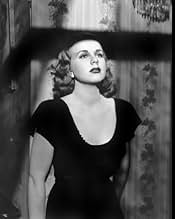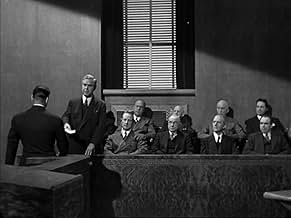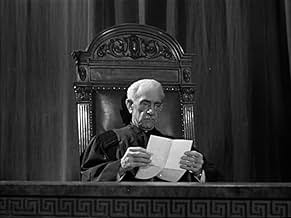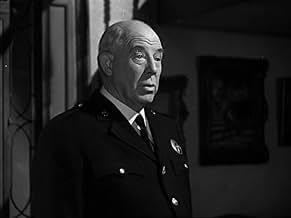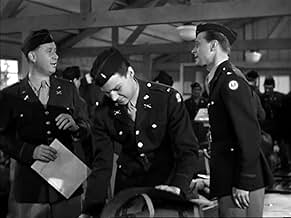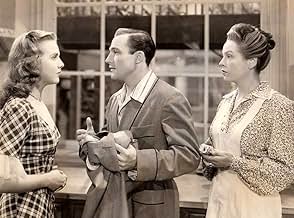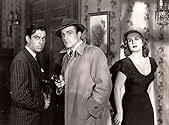IMDb रेटिंग
6.5/10
1.8 हज़ार
आपकी रेटिंग
अपनी भाषा में प्लॉट जोड़ेंA young femme-fatale realizes that the man she married is an incorrigible wastrel.A young femme-fatale realizes that the man she married is an incorrigible wastrel.A young femme-fatale realizes that the man she married is an incorrigible wastrel.
- निर्देशक
- लेखक
- स्टार
- 1 ऑस्कर के लिए नामांकित
- कुल 1 नामांकन
Eddie Acuff
- Steve
- (बिना क्रेडिट के)
Fred Aldrich
- Bartender
- (बिना क्रेडिट के)
Frank Austin
- Jury Member
- (बिना क्रेडिट के)
John Barton
- Concertgoer
- (बिना क्रेडिट के)
Vangie Beilby
- Wedding Guest
- (बिना क्रेडिट के)
John Berkes
- Waiter
- (बिना क्रेडिट के)
Oliver Blake
- Defense Attorney
- (बिना क्रेडिट के)
Charles Cane
- Joe
- (बिना क्रेडिट के)
Wheaton Chambers
- Plane Passenger
- (बिना क्रेडिट के)
Ruth Cherrington
- Concertgoer
- (बिना क्रेडिट के)
James Conaty
- Concert Patron
- (बिना क्रेडिट के)
फ़ीचर्ड समीक्षाएं
This is a strange noir, made even more so by the odd casting of the usually wholesome Deanna Durbin and Gene Kelly as a barely-disguised 'floozie' and an inveterate gambler and murderer respectively! Besides, the title is most ironic since, while it does revolve around just that occasion, the main narrative (which unfolds in flashback, a typical genre device, I might add) hardly evokes a feeling of good cheer – incidentally, this is possibly the only film set around this time of year to depict the Midnight mass traditionally held on Christmas Eve! Christmas HOLIDAY, then, was only director Siodmak's second noir: the result is somewhat pretentious for a movie from this vintage, yet this very quality has helped render it less dated than others of its ilk! I should point out that the late eminent British film critic Leslie Halliwell resented the script's approach to the source material – but, while this is unusually billed in the opening credits as "W. Somerset Maugham's Christmas HOLIDAY as written by Herman J. Mankieiwicz", the author himself was reportedly enthusiastic about the screen rendition!
For the record, I own 10 vehicles by the female lead (who actually initiated the project in an effort to change her child-star image!) but, more by accident than design, this is the first I have watched – and it appears that, not only was the film her personal favorite but also, in her opinion, the only worthy one she ever did! Incidentally, she would again dabble in the thriller genre with the more modest but still interestingly-cast LADY ON A TRAIN (1945), which I do have a copy of. By the way, the actress (who retired from the screen way back in 1948!) has just turned a venerable 90 years old in December! With respect to Kelly, this was his seventh picture (having debuted just 2 years previously) and, in his case, too, he would appear in only one other title in this vein i.e. BLACK HAND (1950), which I have also acquired some time back but have yet to catch up with. As for how the two fare within this seedy/gloomy environment, Kelly is quite good as a ne'er-do-well but Durbin (even though the studio bosses forced her into a couple of numbers – Frank Loesser's "Spring Will Be A Little Late This Year" and Irving Berlin's "Always", with the latter essentially turned into a motif throughout – to appease her established fan-base!) is surprisingly excellent.
Anyway, the plot involves Durbin and Kelly meeting at a concert (the 'Love/Death' theme from Richard Wagner's opera "Tristan And Isolde" – also effectively reprised here for the finale – which, for my money, has been immortalized in two Luis Bunuel films!) and immediately falling in love. When he takes her home to meet his mother (Gale Sondergaard in one of her best roles), the latter realizes the girl (who obviously is unaware of his character foibles) can help her make an honest man of her boy. However, events take a tragic turn as Kelly kills a man in a dispute over money, is caught, tried and condemned. Sondergaard, whose feelings for her son go far beyond motherly love(!), takes it out on Durbin for having failed her – which sends Durbin on her path to perdition (self-imposed, really, so as to be herself in a prison of her own making!) which is how we first see her, offering solace at a New Orleans "joint" to a soldier who has his own beef against love (in fact, he was on his way home to take revenge upon the fiancée who had just jilted him!).
Other prominent characters are the proverbial madam-with-a-heart-of-gold played by Gladys George and Richard Whorf as the sleaziest figure of all, a muck-racking reporter who also operates as something of a pimp in the latter's establishment! The climax, then, sees Kelly escape from prison and (understandably) misconstruing Durbin's particular method of expiation: however, the Law is soon on his tracks, and he dies in a shoot-out with the Police – his dying words to his wife, finally appreciating the nature of her sacrifice, are "You can let go now, Abigail" (promptly reiterated by the young soldier, looking on).
For the record, I own 10 vehicles by the female lead (who actually initiated the project in an effort to change her child-star image!) but, more by accident than design, this is the first I have watched – and it appears that, not only was the film her personal favorite but also, in her opinion, the only worthy one she ever did! Incidentally, she would again dabble in the thriller genre with the more modest but still interestingly-cast LADY ON A TRAIN (1945), which I do have a copy of. By the way, the actress (who retired from the screen way back in 1948!) has just turned a venerable 90 years old in December! With respect to Kelly, this was his seventh picture (having debuted just 2 years previously) and, in his case, too, he would appear in only one other title in this vein i.e. BLACK HAND (1950), which I have also acquired some time back but have yet to catch up with. As for how the two fare within this seedy/gloomy environment, Kelly is quite good as a ne'er-do-well but Durbin (even though the studio bosses forced her into a couple of numbers – Frank Loesser's "Spring Will Be A Little Late This Year" and Irving Berlin's "Always", with the latter essentially turned into a motif throughout – to appease her established fan-base!) is surprisingly excellent.
Anyway, the plot involves Durbin and Kelly meeting at a concert (the 'Love/Death' theme from Richard Wagner's opera "Tristan And Isolde" – also effectively reprised here for the finale – which, for my money, has been immortalized in two Luis Bunuel films!) and immediately falling in love. When he takes her home to meet his mother (Gale Sondergaard in one of her best roles), the latter realizes the girl (who obviously is unaware of his character foibles) can help her make an honest man of her boy. However, events take a tragic turn as Kelly kills a man in a dispute over money, is caught, tried and condemned. Sondergaard, whose feelings for her son go far beyond motherly love(!), takes it out on Durbin for having failed her – which sends Durbin on her path to perdition (self-imposed, really, so as to be herself in a prison of her own making!) which is how we first see her, offering solace at a New Orleans "joint" to a soldier who has his own beef against love (in fact, he was on his way home to take revenge upon the fiancée who had just jilted him!).
Other prominent characters are the proverbial madam-with-a-heart-of-gold played by Gladys George and Richard Whorf as the sleaziest figure of all, a muck-racking reporter who also operates as something of a pimp in the latter's establishment! The climax, then, sees Kelly escape from prison and (understandably) misconstruing Durbin's particular method of expiation: however, the Law is soon on his tracks, and he dies in a shoot-out with the Police – his dying words to his wife, finally appreciating the nature of her sacrifice, are "You can let go now, Abigail" (promptly reiterated by the young soldier, looking on).
Pairing sunny star Deanna Durbin with stormy director Robert Siodmak is like coupling Snow White with Orson Welles. So who's going to win out—Universal's top money earner or noir's artistic vision. It's a struggle between luminous halos, on one hand, and creepy shadows, on the other. Actually the odd pairing works pretty well, thanks to Durbin's genuine acting ability, Gene Kelly's subtle ambiguity, and an unusually suggestive script. Clearly, Durbin is looking to change her virginal type casting, while Kelly has yet (I believe) to settle into his premier dancing career.
But, it's really Kelly's Manette who steals the film, with both a startlingly sly performance and the script's unconventional suggestions of incest and homosexuality. For example, there's a rather emphatic reference to Manette's being his mother's "all", plus mom's (Sondergaard) consuming attachment throughout the film. There's also repeated reference to Manette's "weakness", just ambiguous enough to go beyond a gambling habit. Couple that with his shaded behavior in several scenes, especially in the "anything goes" gambling den. Needless to say, such forbidden themes could only be hinted at in 40's Hollywood.
Adding to the 40's exotica is Durbin playing what amounts to a barroom hooker. She may remain pure at heart—confirmed in the midnight mass scene—nonetheless, the role amounts to a risky departure for Universal's teen idol. Thus director Siodmak's challenge is to reaffirm Abigail's (Durbin) basic innocence no matter what else happens, which he does through selective cameo lighting, even though that conflicts with his noirish sensibility. Then too, Dean Haren's sweetly normal escort is there to reassure fans that underneath it all, Durbin remains Durbin.
And to think the studio entitled this odd excursion into the dark side, Christmas Holiday, of all things. I sympathize with unsuspecting fans plunking down money to see the usual Durbin fluff. Nevertheless, the movie remains a fascinating study in conflicting styles and ambiguous characterization.
But, it's really Kelly's Manette who steals the film, with both a startlingly sly performance and the script's unconventional suggestions of incest and homosexuality. For example, there's a rather emphatic reference to Manette's being his mother's "all", plus mom's (Sondergaard) consuming attachment throughout the film. There's also repeated reference to Manette's "weakness", just ambiguous enough to go beyond a gambling habit. Couple that with his shaded behavior in several scenes, especially in the "anything goes" gambling den. Needless to say, such forbidden themes could only be hinted at in 40's Hollywood.
Adding to the 40's exotica is Durbin playing what amounts to a barroom hooker. She may remain pure at heart—confirmed in the midnight mass scene—nonetheless, the role amounts to a risky departure for Universal's teen idol. Thus director Siodmak's challenge is to reaffirm Abigail's (Durbin) basic innocence no matter what else happens, which he does through selective cameo lighting, even though that conflicts with his noirish sensibility. Then too, Dean Haren's sweetly normal escort is there to reassure fans that underneath it all, Durbin remains Durbin.
And to think the studio entitled this odd excursion into the dark side, Christmas Holiday, of all things. I sympathize with unsuspecting fans plunking down money to see the usual Durbin fluff. Nevertheless, the movie remains a fascinating study in conflicting styles and ambiguous characterization.
Hmmm, I wonder of Tennessee Williams saw this in 1945 and wrote SUDDENLY LAST SUMMER as a riff on this astonishing incestuous masochistic noir. Universal's 1944 "Christmas Holiday"is a startling dark film that is quite explicit in its adult themes of prostitution, self punishment, sexual manipulation, incest and some quite twisted emotional ideas. It even has scenes similar to that same 1959 Taylor Montgomery Hepburn drama. Cleverly, Universal cast music stars Gene Kelly as the handsome spoiled son with the demon mother (Gale Sondergaard) and cherubic Deanna Durbin as the adoring slavish young woman that Mother encourages he marries to keep his amoral unethical character in check. The idea that Mother enthusiastically endorses their marriage so she can control both of them by their sexual desire for each other is a rank idea as slimy as seen in the pre code shocker THE SILVER CORD. I personally found the film riveting and I very much liked the casting against type. For me it gave the film excellent surprise value. Kelly made a terrific seductive rat. Durbin's slide into willing prostitution to 'be with him' in a decadent lifestyle (while he was away) is a great downbeat storyline. Everything about "Christmas Holiday" is deceptive, right from the happy title to the handsome horror of Kelly's character. I will not spoil the story for you other than to say the whole film is a terrific ride, and with a ripe explicit tone, you will be seduced yourself. Plenty of flashback like SORRY WRONG NUMBER and equally as creepy. What a surprise! Hilariously, in Australia it was our Nationwide TV treat at 8.30pm on Christmas night! Haven't our TV programmers got a sly sense of humor.
What a surprise treat to see this rare film as part of a Robert Siodmak Festival at the Cleveland Art Museum in the summer of 2014. It put me back in the mid-WWII period and the beautiful, pristine 35mm print was shown as originally presented on the big screen, thanks to Film Curator John Ewing.
The major attraction here is that Deanna Durbin and Gene Kelly both play against type in a "doctored up" Somerset Maugham story. Siodmak direction is dark, atmospheric and smoothly executed throughout. Deanna sings Irving Berlin's "Always" in a pop style very effectively. A good portion of Wagner's "Liebestod" from Tristan and Isolde is heard in an orchestral setting to heighten the dramatic proceedings.
Both stars work surprisingly well in their very heavy roles, and I found myself glued to the screen during Durbin's depiction. Her acting style has often been subtle, and this performance was one of her most understated. Kelly's role challenged him to reach dramatic heights, and he rises to occasion.
While some of the script is dated, Deanna dominates the screen whenever she's on, and is matched by a fine supporting cast. Truly a worthwhile viewing.
The major attraction here is that Deanna Durbin and Gene Kelly both play against type in a "doctored up" Somerset Maugham story. Siodmak direction is dark, atmospheric and smoothly executed throughout. Deanna sings Irving Berlin's "Always" in a pop style very effectively. A good portion of Wagner's "Liebestod" from Tristan and Isolde is heard in an orchestral setting to heighten the dramatic proceedings.
Both stars work surprisingly well in their very heavy roles, and I found myself glued to the screen during Durbin's depiction. Her acting style has often been subtle, and this performance was one of her most understated. Kelly's role challenged him to reach dramatic heights, and he rises to occasion.
While some of the script is dated, Deanna dominates the screen whenever she's on, and is matched by a fine supporting cast. Truly a worthwhile viewing.
A nice film--and it is nice to see Deanna Durbin shed her little girl image for something with a bit of a bite to it. She plays a singer in a nightclub and is married to Gene Kelly, although he doesn't have much to do in this film. Nice to see some good supporting performances by Gladys George and Gale Sondergaard--although Ms. Sondergaard seems a bit young to play Gene Kelly's mother!!
क्या आपको पता है
- ट्रिवियाBecause of the Hays Code, screenwriter Herman J. Mankiewicz changed the setting from a Paris brothel to a nightclub in New Orleans, and changed the main character from a prostitute to a more ambiguous nightclub singer and hostess, in adapting the 1939 novel of the same name by W. Somerset Maugham.
- गूफ़After Robert breaks out of jail, the newspaper spells his last name as "Mannette". However, the correct spelling is "Manette".
- भाव
Simon Fenimore: [to Charles] The planes are all grounded, the trains won't do you any good, and you're too big for me to carry on piggyback.
- कनेक्शनReferenced in Go, Johnny, Go! (1959)
टॉप पसंद
रेटिंग देने के लिए साइन-इन करें और वैयक्तिकृत सुझावों के लिए वॉचलिस्ट करें
- How long is Christmas Holiday?Alexa द्वारा संचालित
विवरण
- रिलीज़ की तारीख़
- कंट्री ऑफ़ ओरिजिन
- भाषा
- इस रूप में भी जाना जाता है
- W. Somerset Maugham's Christmas Holiday
- फ़िल्माने की जगहें
- St Vibiana RC cathedral, Main St, लॉस एंजेल्स, कैलिफोर्निया, संयुक्त राज्य अमेरिका(midnight mass scene)
- उत्पादन कंपनी
- IMDbPro पर और कंपनी क्रेडिट देखें
- चलने की अवधि1 घंटा 33 मिनट
- रंग
- पक्ष अनुपात
- 1.37 : 1
इस पेज में योगदान दें
किसी बदलाव का सुझाव दें या अनुपलब्ध कॉन्टेंट जोड़ें



